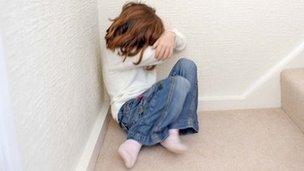Young homeless underestimated by Britons, says survey
- Published

The survey coincides with the International Day for Street Children
The level of young homelessness in the UK is underestimated by over two-thirds (68%) of Britons, a survey suggests.
The research among 2,000 adults by the Consortium for Street Children (CSC) found that most people (61%) associated street children with Africa and Asia.
Fewer than one in 10 of those asked said they would feel compelled to help children sleeping rough.
CSC chief executive Sally Shire called on society to recognise that "being a street child is not a crime".
'Birth registration'
The survey found that four out of five people asked were not aware that an estimated 100,000 children become runaways in the UK every year.
More than one in five (21%) would worry about crime if they saw young people sleeping rough.
Of those surveyed, 13% thought the issue of street children was a problem in western Europe.
The CSC is urging governments around the world to stand up for the rights of young homeless people.
Ms Shire said: "Across the globe there are large numbers of children surviving on the streets.
"Whether they are a runaway from Derby or a street child in Delhi the factors that drive children to the streets are similar.
"Being a street child is not a crime. We want governments and society to recognise this."
She added: "These children have the same rights as every other child. A recent United Nations High Commissioner for Human Rights study into street children made a number of recommendations for how street children's rights can be strengthened.
"This includes universal birth registration for all, and that rather than treat street children as criminals authorities should understand the reasons for street children's behaviour and provide support."
Lack of funding
The survey, conducted by OnePoll, was commissioned by the CSC to coincide with the <link> <caption>International Day for Street Children</caption> <url href="http://www.streetchildrenday.org/" platform="highweb"/> </link> .
Andy McCullough, head of UK policy and public affairs at the charity Railway Children, who grew up as a street child, said street children faced different forms of abuse and had "no legitimate rights to funds and benefits."
Most street children are either kicked out of their houses, experience domestic violence or fall out with their parents but have nowhere to go as they cannot claim housing benefits, he said.
Mr McCullough has spent many years working with street children and his experience has been that they become homeless in the long run.
"Street children are over-represented in the mental health system, the criminal justice system and there are clear correlations," he said.
Lack of funding is seen as one of the main problems facing projects involving street children.
'Root causes'
Mr McCullough said: "If you want to work with the street children you have to go to the streets, the estates, the street corners.
"You can't expect them to reach out to you. Lots of the people working for street children try to do it from their desks."
The Department for Education said runaway children typically faced very complex issues.
A spokesman said: "Local authorities are responsible for targeted support for families with complex needs and young people at risk of substance misuse, youth crime and teenage pregnancies - which can be the root causes and consequences of running away.
"We are providing funding through the Early Intervention Grant which they can use to invest directly in services to safeguard vulnerable children and young people.
"And we are working with a range of charities and organisations to strengthen national support to help them do this."
- Published8 March 2012
- Published24 February 2012
- Published23 February 2012